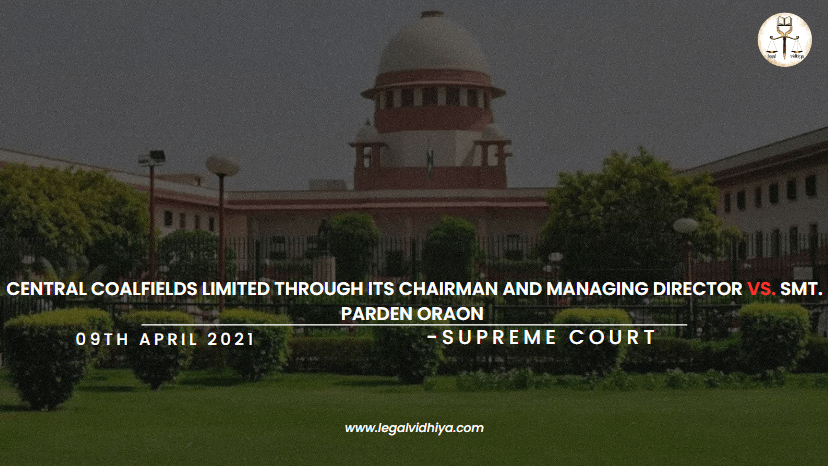
| CITATION | AIR 2021 SUPREME COURT 1876, AIRONLINE 2021 SC 190, 2021 (2) AJR 238 |
| DATE OF JUDGMENT | 09th April 2021 |
| COURT | Supreme Court of India |
| APPELLANT | Central Coalfields Limited Through its Chairman and Managing Director & Ors. |
| RESPONDENT | Smt. Parden Oraon |
| BENCH | Justice S. Ravindra Bhat, Justice L. Nageswara Rao |
INTRODUCTION
The case of Central Coalfields Limited vs. Parden Oraon addresses the issue of compassionate appointment in the context of an employee’s civil death. The Supreme Court of India adjudicated the dispute, which arose after the respondent sought a job for her son following the disappearance and subsequent civil death declaration of her husband, an employee of Central Coalfields Limited.
FACTS OF THE CASE
- The respondent’s husband, an Operator at Gidi Washery, went missing on 3 October 2002.
- A police report was filed, and the employer, Central Coalfields Limited, was informed.
- An inquiry led to the termination of the missing employee’s services on 21 September 2004.
- The respondent filed a suit for the civil death declaration, which was decreed effective 23 December 2009.
- The respondent requested a compassionate appointment for her son on 17 January 2013, which was rejected.
- The High Court of Jharkhand quashed the termination and directed the employer to reconsider the compassionate appointment, a decision upheld by the Division Bench.
ISSUES RAISED
- Whether the respondent’s son is entitled to a compassionate appointment despite the significant delay in application.
- Whether the rejection of compassionate appointment based on the respondent’s existing employment is valid.
- Whether the National Coal Wage Agreement permits compassionate appointments in cases of civil death.
CONTENTIONS OF APPELLANT
- The request for compassionate appointment was delayed by more than ten years, undermining the purpose of such appointments.
- The respondent’s existing employment should disqualify her son from receiving a compassionate appointment.
- The decision by the Directors (Personnel) in 2013 should be treated as a binding policy that excludes compassionate appointments for dependents of employees who have suffered civil death.
CONTENTIONS OF RESPONDENT
- The National Coal Wage Agreement does not explicitly prohibit compassionate appointments in cases of civil death.
- The respondent promptly pursued a civil death declaration and participated in the departmental inquiry.
- The respondent’s son requires employment to support the family following her retirement.
JUDGEMENT
The Supreme Court agreed with the High Court that the reasons provided by the employer for denying the compassionate appointment were unjustified. However, the Court held that due to the significant delay in applying for the compassionate appointment (over ten years since the husband went missing), the request could not be granted. The Court emphasized that the purpose of compassionate appointments is to provide immediate relief to the family of a deceased employee.
ANALYSIS
The Supreme Court’s ruling in Central Coalfields Limited vs. Parden Oraon addresses the necessity for timely applications in compassionate appointments. The core issue was the delay in seeking such an appointment, with the request made over a decade after the respondent’s husband went missing. The Court emphasized that the primary objective of compassionate appointments is to provide immediate financial relief to the bereaved family. The significant delay undermines this purpose, as the immediate financial crisis typically diminishes over time. The Court also scrutinized the employer’s reasons for denial, such as the respondent’s employment and internal policy decisions, finding them insufficient. However, despite procedural shortcomings by the employer, the delay in application justified the denial. This decision underscores that compassionate appointments are not entitlements to be claimed at any time, but timely interventions to address immediate financial needs.
CONCLUSION
The Supreme Court’s decision in Central Coalfields Limited vs. Parden Oraon sets an important precedent on the timeliness and intent of compassionate appointments. While it acknowledges that procedural grounds cited by employers, such as the existing employment of a family member and internal policy decisions, may not be sufficient to deny compassionate appointments, it emphasizes the necessity of timely applications. Compassionate appointments are designed to provide immediate support to families during their time of financial crisis due to the sudden loss of an employee. Therefore, applications made many years after the event fail to meet this primary objective. This case reinforces the need for dependents seeking compassionate appointments to act promptly, ensuring that the relief provided serves its intended purpose of addressing immediate financial hardships. The ruling highlights a balance between procedural justice and practical considerations, ensuring that compassionate appointments remain a tool for immediate support rather than a delayed entitlement.
REFERENCES
This Article is written by Avani Kanswa student of Institute of Law, Nirma University, Ahmedabad; Intern at Legal Vidhiya.
Disclaimer: The materials provided herein are intended solely for informational purposes. Accessing or using the site or the materials does not establish an attorney-client relationship. The information presented on this site is not to be construed as legal or professional advice, and it should not be relied upon for such purposes or used as a substitute for advice from a licensed attorney in your state. Additionally, the viewpoint presented by the author is of a personal nature.




0 Comments